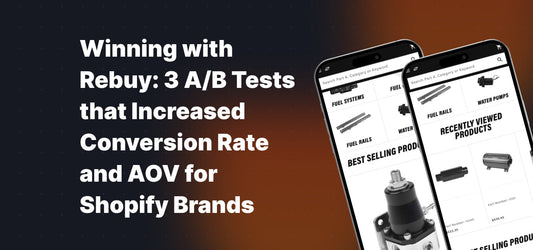Table of Contents
Get useful eCommerce stuff
For today's savvy shoppers, online reviews are a go to source of information. Trusted as much as personal recommendations, over 90% of consumers say they use reviews to assess a business and its products or services before committing to a purchase.
As a result, more and more brands are using review collection platforms to build and maintain a competitive online reputation.
REVIEWS.io and Trustpilot are two of the most popular solutions. Both allow for the collection, publication and management of customer feedback, and offer a range of tools to support business growth. In choosing the right platform for your business, there’s a few things you’ll need to consider.
Google Review Partners
Whatever review collection platform you use, make sure it’s a Google Licensed Partner. This means Google recognises customer feedback as genuine, and sees it as evidence of a trustworthy brand. You’ll be eligible for Google Seller Ratings, and achieve better paid and organic search results with Rich Snippets and Stars - boosting online visibility and click-through rates whilst lowering ad spend.
REVIEWS.io:
REVIEWS.io is a licensed Google Review Partner. Company and product reviews can be carried over to Ads, Rich Snippets and Google Shopping, and contribute towards Google Seller Ratings. Reviews can be left by verified customers through automated email and SMS invitations.
The platform has strict moderation policies that comply with Google regulations, meaning reviews are only removed if found to be non-compliant. This encourages full transparency, and the ability to openly respond ensures brands can effectively manage negative feedback.

Trustpilot:
Trustpilot is also a licensed Google Review Partner, which means it offers the same benefits as REVIEWS.io in this respect. You’ll see the same gains in terms of Seller Ratings and Stars, and moderation policies follow the same regulated guidelines.
However, the primary difference is in collection. Trustpilot’s Automated Feedback Service (AFS) is used to collect verified feedback, but it also allows for open review collection, meaning anyone is free to comment without invitation.
Winner:
Both. Since both are Google Review Partners there’s little to differentiate between the two. Whilst REVIEWS.io also allows for open review collection its procedures are a little more stringent, so the primary consideration is whether you want a fully open platform or not.
SEO Features
Alongside trust, one of the benefits of review collection is increased online visibility. Whilst both platforms are Google Review Partners, you should also consider the additional SEO features and how they contribute to your search rankings.
REVIEWS.io:
Customer feedback collected through REVIEWS.io is automatically optimised for Google. Brands can easily embed widgets directly onto their website that are Rich Snippet friendly, helping them generate stars in organic search results.

Trustpilot:
Essentially, Trustpilot offers the same SEO benefits as REVIEWS.io. There is one point of difference though. Trustpilot has a much larger market share, and subsequently, a much greater domain authority. This means that brands with a business profile on Trustpilot may benefit from the platform's own online presence.

Winner:
Debatable. You could say trustpilot based purely on domain authority. It is not entirely clear if any of that authority is passed to a site linked from Trustpilot. It’s also a metric that holds increasingly less weight in SEO, so in essence, there’s very little to distinguish between the two platforms here either.
Social Media Integration
Used by millions of people everyday, social media is the primary means by which the next generation of shoppers discover new brands. Collecting reviews across social platforms increases brand awareness and drives website traffic, boosting conversions and sales. It also gives you the opportunity to leverage brand advocates and social influencers.
REVIEWS.io:
This platform offers some great social media integrations. For Facebook, you can send review invites that direct users straight to your business page, boosting your profile and visibility. But it’s the Instagram integrations that really stand out. The Customer Voice app allows you to curate and customise Instagram content, and its Influencer Discovery feature helps you identify influencers already invested in your brand.
Trustpilot:
Facebook users can add a Trustpilot tab to their business page to showcase customer reviews. The platform also offers a Hootsuite integration so you can share reviews across all channels from a single source. There’s also an image generator where you can combine text reviews with visuals for use in social media marketing.
Winner:
REVIEWS.io. Though Trustpilot offers some decent social media integrations, they’re essentially limited to review publication. Features available from REVIEWS.io allow you to harness the real power of platforms like Instagram by building a community of influential brand advocates.
Data Ownership
This is a complex topic that covers various data rights and responsibilities. For the purpose of simplicity here, we’re talking about review content, and who possesses ownership.
REVIEWS.io:
REVIEWS.io allows you to easily export reviews, and ownership of content is passed to you, the customer.
Trustpilot:
By contrast, Trustpilot retains ownership of content and does not pass it on to the customer.
Winner:
REVIEWS.io. As a paid for service, it seems unjustified that the customer is not given ownership of review content, so the REVIEWS.io approach is far more preferable.
Contracts
Before signing up to a service of any kind, be sure to read the contract in full. This tells you everything you need to know about the business and its offering, and should detail full terms and conditions, including fees, additional charges and contract duration. Always look out for the small print, particularly if you’re a start up with limited capital.
REVIEWS.io:
REVIEWS.io offers 30 day rolling contracts for its services. This makes it an accessible platform for everyone and goes a long way to show the business has confidence in its solution, placing performance before anything else.
Trustpilot:
Trustpilot operates on annual contracts, so if you’re signing up be absolutely sure it’s the right choice. These contracts are also subject to auto renewal which may include a price hike. Whilst this isn’t an uncommon practice, it can be difficult to get out of if you’re unhappy with the service provided.
Winner:
REVIEWS.io. Short term contracts are by far the better option. They give you the freedom to leave should you choose and the chance to test run a solution without long term commitment.
Platform Usability for Customers
You’ll also want to consider platform usability from your customers perspective. How simple is the review site to navigate? Can they easily source feedback on the type of business they’re looking for?
REVIEWS.io:
The REVIEWS.io site has a clean layout with at a glance ratings and merchant metrics. Priority seems to be given to video and social proof content. Search functionality is limited though, with no options to search by business type.

Trustpilot:
Trustpilots interface is a little more sophisticated. Users can search for a business by category and sub-category, with results ordered according to a brands TrustScore. They can also see review count by reviewer, and read feedback left for other brands to get a better idea of how trustworthy their opinion is.

Winner:
Trustpilot. The review collection site itself currently has a little more to offer from an end user perspective.
Integrations
As a bare minimum, you’ll want seamless integration with your eCommerce platform. But beyond that, you should consider the other tools and applications you use, and whether your chosen review solution is compatible. This will allow you to streamline processes and get the most from your review content.
REVIEWS.io:
REVIEWS.io offers multiple integrations, inclusive of all the major eCommerce platforms, as well as CRM and marketing solutions, reward programmes and social networks. If you’re looking to integrate with a platform not already covered, its development team will build a custom integration for you.
Trustpilot:
Trustpilot also offers an impressive range of integrations. Again, this covers all the major names in eCommerce, and a host of digital marketing, social and customer support tools.
Winner:
Subject to requirements. The best platform for you depends entirely on the needs of your business and which tools you require integration with. Check out exactly what each offers before making your decision.
Review Gathering Strategy
How you’re able to collect reviews is another consideration. Is it by invitation only? Or can anyone access your company page and leave feedback regardless of whether they’re a genuine customer or not? There are pros and cons to each approach.
REVIEWS.io:
As a general rule, REVIEWS.io works by invitation only with review requests sent via email or SMS. This ensures only verified customers are able to leave feedback. You could suggest this allows brands to be selective with their strategy, however, should a customer wish to leave a review without invitation, they can contact the REVIEWS.io team with proof of purchase to request permission. Brands can also opt to have an open platform, allowing anyone who wants to leave a review to do so.
Trustpilot:
Trustpilot’s platform is completely open. Businesses can send customised review requests post purchase, but it’s not a requirement for customers to leave feedback. This encourages full transparency and gives those reading reviews confidence that they’re a trustworthy reflection of a brand, though it does leave businesses open to fake reviews. Trustpilot’s safeguarding policies go some way to mitigate this risk, but they do not completely remove it.
Winner:
Trustpilot. From a customer's perspective at least, Trustpilot’s open platform holds more authority. Though that could be up for debate. Fake reviews are a common problem, and although moderation policies are in place, they might not get it right everytime.
Visual Reviews
The review space is changing, and customers are increasingly looking for visual content to inform their purchase decisions. Photo and video reviews are not only more engaging for the consumer, they also help brands collect valuable user generated content to use across all their marketing channels.
REVIEWS.io:
Through REVIEWS.io’s invitation emails, customers can easily upload both photo and video reviews. The latter are highly beneficial for brands, as they allow them to show both the opinions and experiences of past customers through the most consumed form of content. Both review types can easily be incorporated into websites and landing pages, and shared across social platforms.

Trustpilot:
Trustpilot allows customers to upload their own product imagery alongside a text review, but has yet to launch a video review feature.
It does, however, offer multiple widgets to suit brands' different style preferences. Here are a few examples of what these look like:

Image: Screenshot taken from powerland.co.uk

Image: Screenshot taken from bloomandwild.com

Image: Screenshot taken from octopus.energy
 Image: Screenshot taken from oddbox.co.uk
Image: Screenshot taken from oddbox.co.uk
Winner:
REVIEWS.io. The REVIEWS.io platform offers a distinct advantage through its video review capability, allowing brands to easily generate valuable UGC that’s engaging, influential and on trend.
Social Proof
Social proof is incredibly important. Showing the popularity of your brand is a way of building trust, conveying value and generating desire. As one of the most powerful forms of social proof, reviews should be shared effectively, so look for a platform that helps you do just that.
REVIEWS.io:
REVIEWS.io gets top marks on this point. Its dedicated Social Proof Custom Editor is a user friendly solution to turn authentic review content into branded banners. There are multiple options for customisation to keep content aligned with your existing brand image, and it’s easy to pull UGC through for graphics that really connect with your audience.

Trustpilot:
We mentioned Trustpilot’s image generator earlier, and whilst this is a handy tool for creating graphics for social proof, it’s a little limiting and not quite on par with the REVIEWS.io solution. Essentially, the platform doesn't seem as heavily focused on this area of the review strategy.
Winner:
REVIEWS.io. With a dedicated feature for social proof that gives brands full control over their content creation. REVIEWS.io is a clear winner here.
Multiple User Access
If you’re a small team this one may not be applicable, but for businesses with dedicated departments it’s something to look out for. Customer support, sales, marketing: a platform that allows for multiple users gives all your teams access to valuable information and resources.
REVIEWS.io:
Within the REVIEWS.io platform, the main account administrator can create unlimited user profiles. Each profile can be customised, permitting full or limited access.
Trustpilot:
Again, it’s easy to set up multiple account users with Trustpilot, but with one major difference. All account holders are automatically granted full admin rights, giving them access to all platform features.
Winner:
Subject to requirements. If you’re not concerned with access rights, Trustpilot’s multi user functionality raises no issue. However, if you want to limit user permissions for certain teams, the REVIEWS.io solution is the better fit.
Reviews.io vs Trustpilot: Which is Your Winner?
Both REVIEWS.io and Trustpilot have pros and cons, and for some really big points like SEO and Google Seller Ratings are tied in terms of what they have to offer. However, REVIEWS.io seems to be taking strides in all the right directions with some impressive features that take review collection to the next level.
In particular, it’s Social Proof Editor and Influencer Discovery feature allow brands to really elevate their online reputation, and video reviews help generate engaging UGC with real sales power. These tools go beyond standard review collection and in turn give added value to the REVIEWS.io platform.
Of course, the needs of your business will determine the best solution for you, so be sure to discuss each service thoroughly with the respective customer support team. There’s also the option to test drive each solution with a free trial before making your final decision.
If you need any assistance integrating either of these apps with your Shopify store, feel free to get in touch with our team.
About the author

Adam Pearce Co-Founder and CEO
Adam Pearce is the Co-Founder and CEO of Blend, a leading Shopify CRO Agency. With a background in Management Consulting and Digital Marketing, Adam has been pivotal in Blend's growth and success. His expertise in Customer Value Optimisation (CVO) and deep understanding of eCommerce have made Blend a trusted partner for top Shopify brands.
In his current role, Adam focuses on strategic partnerships and ensuring Blend delivers exceptional results. He is also the co-founder of the eCom Collab Club™, fostering connections within the eCommerce community through events and networking opportunities.








